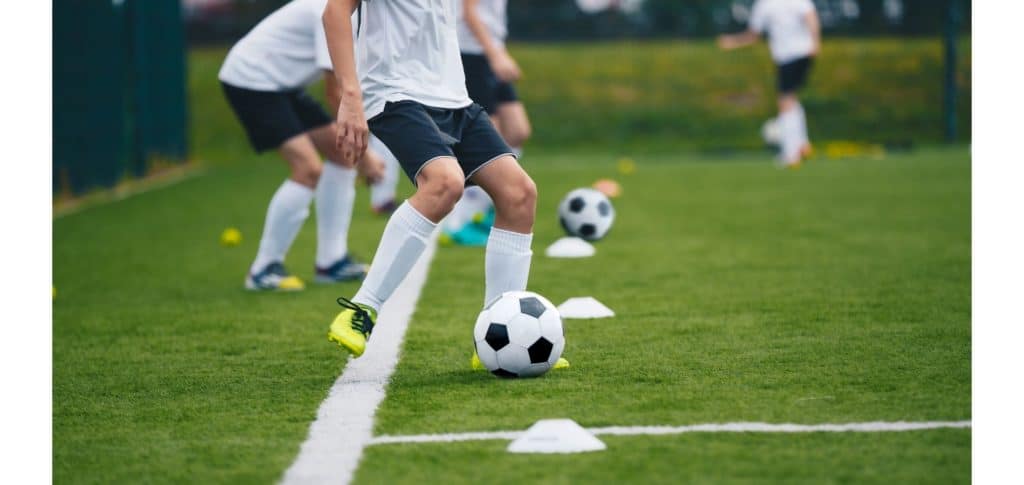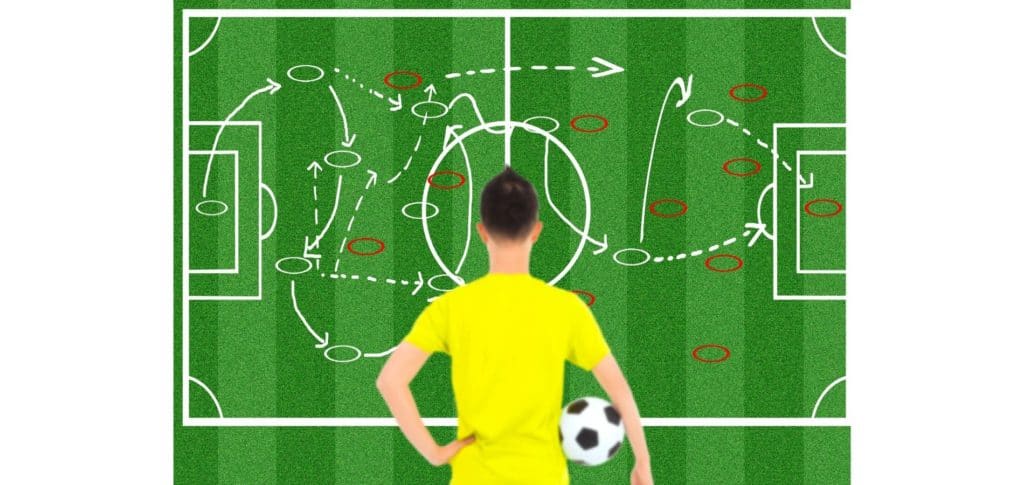The growing physical and mental demands of the modern game have forced professional footballers to completely reshape a large part of their lifestyles around the sport.
This includes the activities that they are engaged in prior to the weekend or midweek match.
More specifically, on the day before a game a footballer should usually participate in a light training session with team mates in the morning or afternoon at the club’s specialised facilities, before journeying home for a healthy meal along with sufficient rest in the form of sleep and simple relaxation through calming pastimes like yoga or listening to music.
Training and rest in particular are critically important for professional athletes, because inadequate tactical instruction and fatigue can be two significant drivers of poor or declining performance, especially in sports such as football where the margin for error is ever so small.
I’ll now look at these factors in more detail.
1. Light training

A fairly common misconception some fans like to peddle is that professionals don’t take part in any form of training the day before a game due to the risk of incurring injuries that could impact player availability come matchday.
This hypothesis couldn’t be further from the truth.
In fact, a group of multidisciplined experts on football sports medicine and sports science came up with a pretty simplified example of a weekly pre-season outline that clubs usually adopt.
It looks something like this:
As you can see, the meticulous schedule accounts for team training on a Friday morning, which comes the day before competitive action on Saturday.
Then, on the following day (Sunday), the players are allotted a full 24 hours for recovery.
From this basic regime, you can be able to deduce that football clubs follow a methodical approach when it comes to training:
- Body recovery on the days just after a competitive game
- Ramping up physical intensity in midweek sessions
- Cooling down physical intensity as the weekend match draws nearer, with greater emphasis placed on specific tactical instructions
Ultimately, it’s quite clear to see that light training regimes are a major part of player preparation prior to match day. Even famous players like David Beckham used to practice free kicks on the eve of a game with real-life football mannequins!
2. Eating healthy
Long gone are the days when professional footballers could get by chugging through bottles of alcohol and downing fried foods before and after match days.
With the game as fiercely competitive as it is today, and heaps of foreign talent representing clubs on the field, it’s imperative for footballers to have the energy to be able to make the necessary sprints, commit to tackles and run the yards as part of modern pressing strategy.
This is particularly important for midfielders, who statistically cover greater average distances than any other outfield position within 90-minute games.
A healthy diet has become increasingly important and is now a major part of modern footballer lifestyle.
I’ll now dissect the categories of foods that provide great benefit for these professional athletes.
Carbohydrates
Matt Lovell – a chief nutritionist for the England Rugby team who also works with English international footballers – recommends the process of carbo-loading by depleting carbohydrate reserves earlier in the week before gradually increasing that specific intake as the match approaches.
By limiting carbohydrate intake at the start of the week, the muscles in the body are forced to increase carbohydrate (GLUT-4) reception as a way of squeezing out the little blood sugar that is available.
The process, when implemented correctly, is said to increase athlete glycogen stores by up to as much as 50%, which is quite staggering.
Protein
Additionally, footballers need to incorporate protein into their diets as it promotes muscle repair and recovery.
Foods that fit into this category include fish, chicken and beef and quite a number of footballers include these as part of their staple meal after games.
As body joints endure significant amounts of stress due to continuous movement and changes in direction, cuisine that is rich in omega 3 fatty acid EPA is able to reduce inflammation which can hamper an athlete’s healing and recuperation.
Fruit and vegetables
These are necessary as part of a balanced diet as well as the fact that their intake eases digestion and prevents gastrointestinal discomfort.
One of the last things a player would want is a crippling stomach ache on the morning or even a couple of hours before a game.
Such an issue would disrupt their pre-match routine and mental flow, which can have a detrimental impact towards their subsequent performance on the pitch.
So, footballers often incorporate things like leafy lettuce, bananas that are high in potassium content, in addition to stuff like broccoli, carrots, grapes and apples within their diet.
Before I move onto the next point, I’ll leave you with this brief video which summarises what footballers eat:
3. Positive visualisation

A largely underrated factor that plays a part in modern sports is psychology.
The introduction of things like video assistant refereeing and goal-line technology have made winning margins even finer within today’s game.
Therefore, mental reinforcement techniques certainly come in handy for footballers who desire that extra competitive edge.
Former Manchester United player Wayne Rooney recalls using positive visualisation before games to give him the extra sharpness that he needed once he stepped onto the pitch, and to mentally prepare himself for particular match scenarios by replaying events that were likely to occur in his mind.
4. Sleeping well
Lastly, getting enough sleep has been scientifically proven to play a vital part in athletic performance.
Roger Federer – who is a legend of lawn tennis – and basketball sensation Lebron James are both heavy advocates for 10 or more hours of sleep each night.
In fact, one particular study conducted by Stanford University illustrated that basketball players who slept for the aforementioned time period registered a 9% improvement in shot accuracy as well as shorter reaction times.
Nick Littlehales – an elite sports sleep coach – recommends that footballers should think of sleep in cycles as opposed to rudimentary hours, together with sleeping polyphasic ally by taking shorter periods of rest at night and making room for recovery time during midday.
Over the years Nick has become renowned for his advice and conditioning with regard to sleep patterns.
He’s had the privilege of prescribing mattress types to legends like Ryan Giggs, as well as giving Gareth Bale a consultation to deal with the Welshman’s problem of low energy levels in the early morning.
There’s no doubt that football clubs throughout the world are urging their players to get an adequate night’s sleep on the days before games, with sleep deprivation known to cause lapses in concentration that could see a side concede from a set piece or a player miss a crucial penalty from the spot.
Conclusion
So, what do footballers do the day before a game?
Well, if you’ve read this article in its entirety, you’ll be aware that on the day prior to matchday, players will take part in a light training session, eat healthy meals that consist of carbohydrates, proteins, fruit and vegetables, as well as visualise great performances through mental recollection and rest through sleep and relaxation.
If you have any interesting thoughts or comments on the article, feel free to share them in the section beneath.
If you enjoy the content that I create and would like to buy me a coffee, then I’d really appreciate it!
Any money that I earn through this donation will be re-invested into more content for this website.
Additionally, by sending in a donation you’ll also receive a copy of my recently released 190+ page eBook on Soccer Ball Care, as well as be subscribed to our mailing list where you’ll be regularly informed on the latest developments concerning the Soccer Whizz blog.
- Future Icons: Europe’s Emerging Midfield Maestros Set for Glory - December 4, 2023
- Kickstarting a Revolution: How Soccer Transformed the United States Over the Last Four Years - October 7, 2023
- 4-1-4-1 Soccer Formation [Analysis] - September 23, 2023

